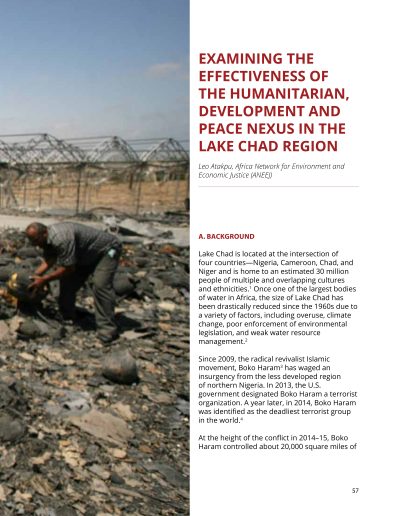
Donor interests over effective development cooperation?
USAID and the “triple nexus” approach in the Philippines
Leo Atakpu, Africa Network for Environment and Economic Justice (ANEEJ)
Humanitarian action alone cannot address the root causes of persisting challenges and vulnerabilities... A humanitarian response is being linked up to development initiatives, and greater investment in development especially at the local level must complement humanitarian action.
In this chapter, ANEEJ‘s Leo Atakpu examines the history and current condition of communities and aid efforts in the four countries connected by Lake Chad and provides an assessment and recommendations to the application of the Triple Nexus approach in the Lake Chad region.
TABLE OF CONTENTS
POLITICAL CHAPTER: Aid in the Time of a Global Pandemic: Confronting the challenges of fragility, poverty and climate change
I. REFLECTIONS ON FRAGILITY, CONFLICT AND THE TRIPLE NEXUS
1. Donor interests over effective development cooperation? USAID and the “triple nexus” approach in the Philippines
2. A region embattled: Situating the Triple Nexus in the Asia-Pacific context
3. Examining the effectiveness of the Humanitarian, Development and Peace Nexus in the Lake Chad region
4. Engendering the Nexus: Mainstreaming gender in the Triple Nexus, a case study from Mali
5. Vision on social protection systems and social security in Palestine
6. Fragility, the challenge of our century
II. RESPONDING TO A CLIMATE EMERGENCY
1. Climate change and development cooperation in South Asia
2. The World Bank’s climate finance: Transformative change, or doubling down on neoliberal globalisation?
3. Escazu Agreement: An opportunity for the peoples of Latin America and the Caribbean in the face of environmental crises
III. GLOBAL AID TRENDS
1. GLOBAL AID TRENDS CHAPTER: The future of aid in the time of the pandemic: What do global aid trends reveal?
2. Challenges for the construction of South-South Cooperation by and for the people
3. International cooperation for educational justice
4. A worsening poverty landscape with COVID-19
5. Debt relief and ODA
6. A Pacific compact
7. Aid performance: Belgium called to do better
8. Canada’s international assistance: underfunded feminist ambitions
9. Does the ‘Global EU Response’ to COVID-19 match the global expectations for the biggest bloc providing ODA?
10. France: A key layer in the future of aid, despite an inadequate response to the crisis?
11. Increases in Japan’s ODA/GNI Ratio: Should we celebrate it?
12. Sweden: Drive for democracy, feminist foreign policy, climate and biodiversity remain key priorities in the context of the COVID-19 pandemic
13. United Kingdom: COVID as catalyst: seismic shifts in UK aid
